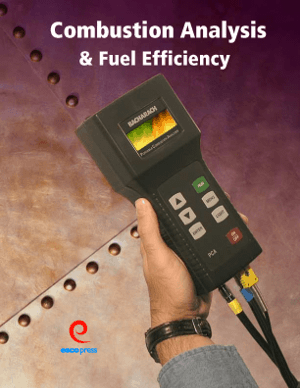
This course is about combustion system performance and maximizing efficiency. Specifically designed for HVAC technicians, boiler contractors, service contractors, facilities maintenance personnel and energy managers, this course is available in two formats, entry level and advanced.
This course has a strong focus toward the understanding of combustion diagnostics and adjustments to improve efficiency, performance and reliability, as well as troubleshooting and diagnosis of flue gas constituents.
All aspects of combustion from basic theory to verification of manufacturer’s specifications and advanced flue gas diagnostics testing are covered thoroughly. Measurement of oxygen, carbon dioxide, carbon monoxide, nitric oxides and sulfur oxides round out the dynamics of assuring efficient combustion. Controlling fuel, flame temperature, excess air and draft are detailed as the instruction directs each technician to maximize efficiency without sacrificing safety.
With the raising cost of energy and global warming looming in the wings, there is a question at hand. How do we minimize our cost of operating heating equipment, conserve energy and reduce carbon emissions (greenhouse gases) while maintaining heating performance?
The answer is, maximize the efficiency of existing furnaces and boilers, as well as verify the performance of newly installed high efficient equipment.
The only way to guarantee that a system is operating at maximum efficiency is to perform a combustion analysis and properly adjusting the air/fuel ratio.
This course is designed to provide the attendee with a full understanding of the combustion process, combustion test procedures and the adjustments required to maximize fuel efficiency.
This course is available in two formats, entry level and advanced.
This course has a strong focus toward the understanding of combustion diagnostics and adjustments to improve efficiency, performance and reliability, as well as troubleshooting and diagnosis of flue gas constituents. All aspects of combustion from basic theory to verification of manufacturer’s specifications and advanced flue gas diagnostics testing are covered thoroughly. Measurement of oxygen, carbon dioxide, carbon monoxide, nitric oxides and sulfur oxides round out the dynamics of assuring efficient combustion. Controlling fuel, flame temperature, excess air and draft are detailed as the instruction directs each technician to maximize efficiency without sacrificing safety.
Attendees are provided a broad introduction to Combustion and Combustion Testing.
This is an excellent overview for technicians, multi-craft trades people, building managers, or anyone interested in understanding the fundamentals of combustion.
Attendees who attended or already have a solid understanding of combustion basics will receive in-depth Combustion Analysis training and preparation for certification testing. Successful candidates will be certified as a "Combustion Analyst".
Testing, Adjustment and Verification Step by Step Test Procedures for:
Combustion Analysis and Fuel Efficiency
Course participants have the opportunity to take the HVAC Excellence Combustion Analysis exam. HVAC Excellence certification in Combustion Analysis will be granted to successful candidates.
This 100 question exam covers combustion theory and heating fuels, carbon monoxide safety, building pressure measurements, building pressure general knowledge, combustion gas, combustion general knowledge, carbon monoxide general knowledge, carbon monoxide measurements and health effects.